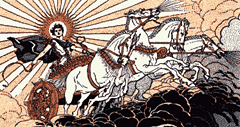 I met Ann Hudson on visiting day at my oldest daughter's Montessori school. Our three year olds were off exploring the classrooms while the parents waited in the gym so Ann and I struck up a conversation about favorite Chicago neighborhoods, cupcakes and writing. I found out she is a poet, with a newly published book of poetry from Ohio University Press. How cool is that? I ran out and bought the book immediately and I must tell you - I loved it. Her poetry is beautiful and true.
I met Ann Hudson on visiting day at my oldest daughter's Montessori school. Our three year olds were off exploring the classrooms while the parents waited in the gym so Ann and I struck up a conversation about favorite Chicago neighborhoods, cupcakes and writing. I found out she is a poet, with a newly published book of poetry from Ohio University Press. How cool is that? I ran out and bought the book immediately and I must tell you - I loved it. Her poetry is beautiful and true.The title of Hudson's book of poetry, The Armillary Sphere, refers to an instrument used in the early days of astronomy to study the circles of the heavens visible from earth. You see the sphere in the 17th century Flemish allegorical oil painting on the gorgeous cover of Hudson's book. The painting depicts in precise detail a cluster of precisely rendered birds before a skyscape of angry storm clouds torn apart by Apollo's sun-chariot. In the foreground, a luminous nude woman holds a bouquet of feathers in one hand and in the other, the tool of the book's title, an object made of golden rings that reveals the answers of the celestial bodies. Like the poetry in this book, the image glows with great beauty, possibility, mystery and meaning.

Despite the obscure name, Hudson's lovely writing is poetry for real people, poetry of real women. I've been getting a poem a day from the Academy of American Poets this April and most of them are really beautiful, but murky in a deliberate way that makes the reading experience pleasant but fleeting, something I'll barely remember. Not so with Hudson. She shot right up into the ranks of my favorite poets - Mary Oliver, Sharon Olds, Emily Dickinson - who write of worlds I recognize, who talk to me about the way I live in it.
The perceptive observations here seem snatched between real-life obligations and hours of salaried work. In "Architect," with a few strokes, she paints a vivid picture of a big-egoed boss: "He wants to fill my desk/at work and home."
In "Equinox," a thrilling poem about standing still and changing at the same time, Hudson writes, "We try to downsize,/slough off old clothes, bad books,/mementos we nest our houses with/to anchor us to where we've been./It doesn't matter that this never works."
Many of the poems create a vision of an urban life that drowns one in its exhausting routine, makes the poet "feel empty/of anything interesting to say," but even here Hudson finds perception and beauty. It is in sensation that the poet finds something to trust: in the morning light, or a "scruffy/dog, who licks his gray muzzle,/then bites at nothing in the winter air." Or a swim at midnight: "to forget all/but the instant, and your body/in it.
I'll say it again; I loved this book. I loved the rich imagery, how Hudson captures that elusive feeling when you are half-way into a dream but fighting to stay awake: "A suck of darkness, a roar in your ears,/and you slip under, lit by a great flurry/of wings, streaks of copper/and black pressing your lids." I loved her reimaging of the story Eurydice as that of the long-suffering wife of a rock star. I loved how the poet untangles complicated feeling - here is what it is like to be a teacher to adolescents and so the object of their gossip and imagination:
I'm the next toy
come to life, after the doll they dressed
and undressed with their friends.
Barbies they twisted into flat,
un-organed sex with plastic Ken,
then abandoned, naked,
in the Dream House to sleep it off,
wiser and looser in the joints.
The Armillary Sphere by Ann Hudson from Ohio University Press









